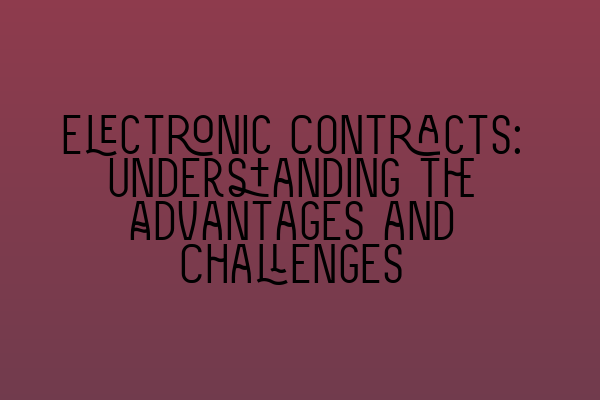Electronic Contracts: Understanding the Advantages and Challenges
In today’s fast-paced digital world, electronic contracts have become increasingly prevalent, revolutionizing the way businesses and individuals engage in transactions. Electronic contracts, also known as e-contracts, refer to agreements created, communicated, and stored electronically. They offer numerous advantages, such as convenience, efficiency, and cost-effectiveness. However, they also come with their own set of challenges and legal implications that we must understand.
Advantages of Electronic Contracts
1. Convenience: One of the primary advantages of electronic contracts is the convenience they offer. Instead of dealing with piles of paperwork and physical signatures, parties can create, send, and sign contracts with just a few clicks. This convenience saves time and streamlines the contract negotiation process.
2. Efficiency: Electronic contracts eliminate the need for physical delivery, reducing the time required to exchange important documents. Parties can quickly transmit contracts, amendments, and other relevant information electronically, allowing for swift decision-making and faster contract execution.
3. Cost-effectiveness: Traditional paper-based contracts involve expenses related to printing, photocopying, postage, and storage. By embracing electronic contracts, businesses and individuals can significantly reduce these costs. Additionally, electronic contracts enable enhanced collaboration and remote work, reducing travel expenses and increasing overall cost savings.
4. Security: Electronic contracts provide digital security features to protect the integrity and authenticity of the agreement. Encryption, digital signatures, and secure storage systems help prevent unauthorized access, tampering, or alteration of contract terms.
5. Environmental benefits: By reducing the consumption of paper and minimizing carbon emissions associated with physical document transportation, electronic contracts contribute to a more sustainable and eco-friendly business environment.
To better understand the advantages and challenges of electronic contracts, it is crucial to be aware of legal considerations and potential risks.
Challenges and Legal Implications
1. Contract Formation: When creating an electronic contract, parties must ensure that it meets the legal requirements for contract formation. Different jurisdictions have their own rules regarding the use of electronic signatures and the intention to be legally bound through electronic means. Addressing these requirements is vital to ensure the validity and enforceability of the contract.
2. Consent and Authentication: Parties must have a reliable method to confirm the identity and intentions of the contracting parties. Verification measures, such as digital signatures, are crucial to authenticate the parties’ consent to be bound by the contract’s terms.
3. Record-keeping and Storage: While electronic contracts facilitate digital storage and retrieval, parties must still comply with legal obligations related to record-keeping and document retention. They need to ensure that contracts are stored securely and remain accessible for the required statutory periods.
4. Dispute Resolution: Despite the many advantages of electronic contracts, disputes may still arise. Parties must consider mechanisms for dispute resolution, including the choice of law and jurisdiction clauses, in case disagreements occur. It is essential to outline procedures for resolving disputes in an effective and efficient manner.
5. Data Protection and Privacy: Electronically transmitted contracts involve the exchange of sensitive personal and business information. Parties must comply with data protection and privacy regulations to safeguard this information from unauthorized access or misuse.
Conclusion
Electronic contracts have significantly transformed the way businesses and individuals engage in contractual agreements. They offer convenience, efficiency, and cost-effectiveness, making them an attractive choice for businesses in various industries.
However, it is vital to understand the legal implications and challenges associated with electronic contracts to ensure their validity, enforceability, and compliance with applicable laws and regulations. By addressing these challenges proactively and seeking professional legal advice, businesses can fully leverage the advantages of electronic contracts while mitigating potential risks.
For more information on contract law and preparation for solicitor qualification exams, take a look at the following related articles:
